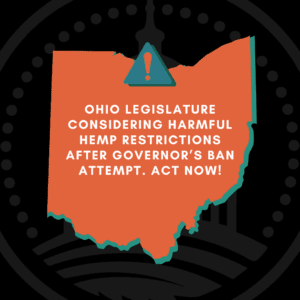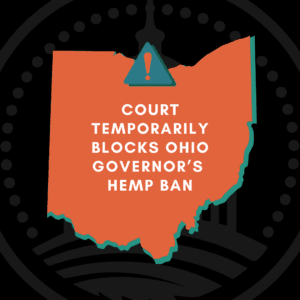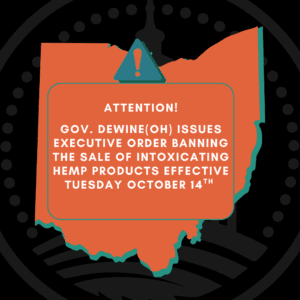INDUSTRY UPDATES
December 19, 2023
Continued Progress in Kentucky’s First-in-the-Nation Adult Cannabinoids Regulation

In late October, we shared the challenges posed by Kentucky’s emergency regulations for adult hemp-derived cannabinoid products, such as those containing delta-8 THC, following the enactment of HB 544. Since then, the U.S. Hemp Roundtable has actively engaged with the Kentucky Department for Public Health (KDPH) to voice our support and our concerns, whileDirector of Operations Katelyn Meckes testified before the Administrative Regulation Review Subcommittee, highlighting both positive amendments and ongoing concerns. Our advocacy has resulted in revised regulations that incorporated many of our recommendations. Here is a recap of the achievements:
- Non-Intoxicating Definition: The revised regulations now state that to be considered non-intoxicating, a hemp-derived cannabinoid product must contain no more than 2.5mg of an adult-use cannabinoid per serving, with a 15 to 1 non-intoxicating cannabinoids to adult-use cannabinoid ratio. This rectification addresses concerns about classifying products with trace THC amounts as adult-use.
- Age Restrictions: The age restriction of 21 or older now applies only to adult-use cannabinoid products, preserving access to non-intoxicating products for a broader consumer base.
- Caffeine Allowance: The prohibition against adding caffeine to hemp-derived cannabinoid products has been lifted, providing more flexibility for product formulation and innovation.
- Expanded Cannabinoid Inclusion: Other non-intoxicating cannabinoids, in addition to CBD, may now be added to ingestible products sold at food service establishments, fostering product diversity.
- Employment Age Limit: Hemp processing or manufacturing facilities may now employ individuals aged 18 to 21 under supervision by someone 21 or older.
- Packaging Requirements: Special packaging and adult-signature requirements for adult-use products have been removed, streamlining the regulatory process for businesses.
- Warning Statements: While unique warning statements for Kentucky are still required, manufacturers can now use QR codes or URL links to direct consumers to these statements, enhancing accessibility.
Some of our concerns that have yet to be addressed, but we will still be working with the Department in the coming months as they continue to improve on the draft. Remaining issues include:
- Burdensome product registration fees – we’ve advised the Department to look at Utah for a simpler example.
- An overreaching prohibited substances list, without an exemption for out-of-state products.
- Complex packaging and labeling requirements.
- Disallowance of adult-use cannabinoids in food products sold by food service establishments.
The Kentucky Department for Public Health has demonstrated responsiveness to U.S. Hemp Roundtable concerns, expressing commitment to address outstanding issues. The KDPH has indicated that another version of the regulation is expected after the first of the year, with the possibility of additional revisions in the Spring.
The collaborative approach between the Administration and the U.S. Hemp Roundtable remains crucial in achieving a final regulation that ensures consumer safety and fair market participation. We extend our gratitude to the Administration for their responsiveness and look forward to continued collaboration in refining Kentucky’s hemp regulations.
Check out these previous updates on Kentucky Delta-8 Regulations
Visit our State Action Center to see active campaigns across the country!
Check out the latest hemp and CBD updates from across the states!
- Ohio Legislature Considering Harmful Hemp Restrictions After Governor’s Ban Attempt. Act Now!The Ohio legislature is reacting quickly to Governor DeWine’s efforts to ban hemp products. While we have been successful thus far in court against his Executive Order, the General Assembly …
- Court Temporarily Blocks Ohio Governor’s Hemp BanWe’re pleased to share that Judge Carl Aveni has granted a Temporary Restraining Order (TRO) blocking Governor Mike DeWine’s executive order banning the sale of “intoxicating hemp” products in Ohio. …
- Gov. DeWine(OH) Issues Executive Order Banning Intoxicating Hemp ProductsYesterday, Ohio Governor Mike DeWine issued an executive order banning the sale of “intoxicating hemp” products, effective next Tuesday, October 14th. Today, the Ohio Department of Agriculture issued emergency regulations to implement the order, making clear that DeWine is targeting …




